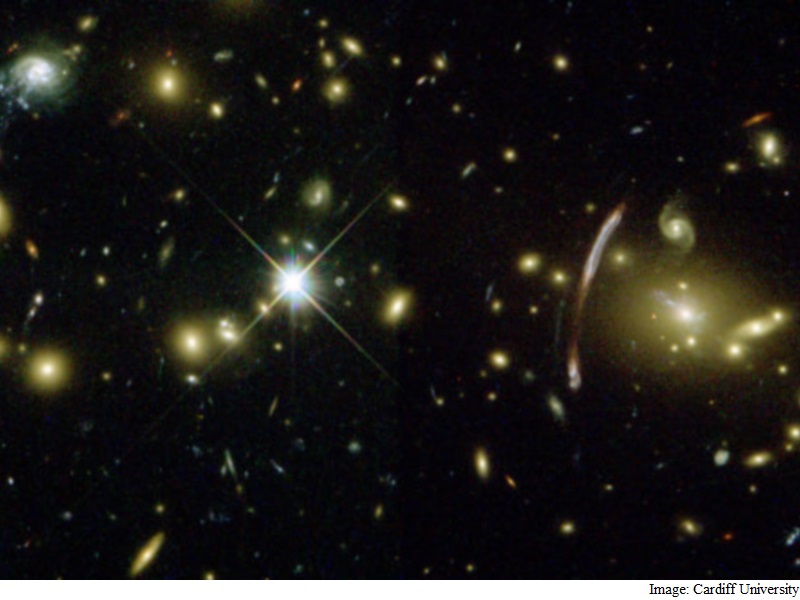- Home
- Science
- Science News
- Astronomers Uncover Evidence of Galaxy Metamorphosis
Astronomers Uncover Evidence of Galaxy Metamorphosis

From round disks to oval clusters; many galaxies in the Universe have undergone a dramatic transformation over the past eight billion years or so, researchers reported on Thursday.
An international team looked at data on some 10,000 of the billions of galaxies in the observable Universe today, and then used the Hubble and Herschel telescopes to peer back in time.
They found that 83 percent of stars formed since the Big Bang about 13.7 billion years ago, were initially grouped in flat, rotating, disc-shaped galaxies, according to a statement from the Cardiff University's School of Physics and Astronomy, whose astronomers led the study.
"However, only 49 percent of stars that exist in the Universe today are located in these disc-shaped galaxies, the remainder are located in oval-shaped galaxies," it said.
"The results suggest a massive transformation in which disc-shaped galaxies became oval-shaped galaxies."
The bulk of stars in the Universe are thought to have been formed between 12 billion to eight billion years ago.
The team offered two hypotheses oval galaxies may be formed when two disc-shaped clusters move too close to one another and are merged by gravity into a disorderly clump, or the stars in a round, flat galaxy gradually migrate towards the centre to produce a disorderly, roughly oval-shaped pile-up.
Such galactic shape-shifting had been theorised before, said lead author Steve Eales. "But by combining Herschel and Hubble, we have for the first time been able to accurately measure the extent...
"Galaxies are the basic building blocks of the Universe, so this metamorphosis really does represent one of the most significant changes in its appearance and properties in the last eight billion years," he said.
For the latest tech news and reviews, follow Gadgets 360 on X, Facebook, WhatsApp, Threads and Google News. For the latest videos on gadgets and tech, subscribe to our YouTube channel. If you want to know everything about top influencers, follow our in-house Who'sThat360 on Instagram and YouTube.
Related Stories
- Samsung Galaxy Unpacked 2025
- ChatGPT
- Redmi Note 14 Pro+
- iPhone 16
- Apple Vision Pro
- Oneplus 12
- OnePlus Nord CE 3 Lite 5G
- iPhone 13
- Xiaomi 14 Pro
- Oppo Find N3
- Tecno Spark Go (2023)
- Realme V30
- Best Phones Under 25000
- Samsung Galaxy S24 Series
- Cryptocurrency
- iQoo 12
- Samsung Galaxy S24 Ultra
- Giottus
- Samsung Galaxy Z Flip 5
- Apple 'Scary Fast'
- Housefull 5
- GoPro Hero 12 Black Review
- Invincible Season 2
- JioGlass
- HD Ready TV
- Laptop Under 50000
- Smartwatch Under 10000
- Latest Mobile Phones
- Compare Phones
- Redmi Turbo 4
- Vivo Y200+
- Lava Yuva 2 5G
- OnePlus Ace 5
- OnePlus Ace 5 Pro
- Oppo A5 Pro 5G
- Vivo Y29 5G
- Honor Magic 7 RSR Porsche Design
- Asus Zenbook S 14
- MacBook Pro 16-inch (M4 Max, 2024)
- Honor Pad X9 Pro
- Honor Pad V9
- boAt Enigma Gem
- boAt Enigma Daze
- Sony 65 Inches Ultra HD (4K) LED Smart TV (KD-65X74L)
- TCL 55 Inches Ultra HD (4K) LED Smart TV (55C61B)
- Sony PlayStation 5 Pro
- Sony PlayStation 5 Slim Digital Edition
- Blue Star 1.5 Ton 3 Star Inverter Split AC (IC318DNUHC)
- Blue Star 1.5 Ton 3 Star Inverter Split AC (IA318VKU)

















